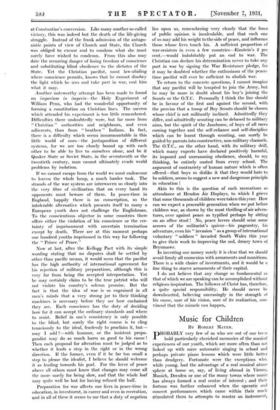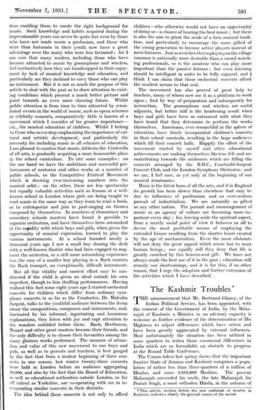Music for Children
By ROBERT MAYER.
-pROBABLY very few of us who are out of our tevis hold particularly cherished memories of the musical experiences of our youth, which are more often than not linked up with mere automatic singing in school and perhaps private piano lessons which were little better than drudgery. Fortunate were the exceptions who, while young, had the advantage of a real musical atmo- sphere at home or, say, of living abroad in Vienna, Munich, Dresden or one of the many towns, where music has always formed a real centre of interest ; and their fortune was further enhanced when the operatic and concert performances which came within their reach stimulated them to attempts to master an instrument, thus enabling them to create the right background for music. Such knowledge and habits acquired during the impressionable years can never be quite lost even by those who have not made music a profession, and those who were thus fortunate in their youth now have a great advantage over the many who were less favoured ; for I am sure that many readers, including those who have become attracted to music by gramophone and wireless, feel instinctively how they are handicapped in their enjoy- ment by lack of musical knowledge and education, and particularly are they inclined to envy those who can play an instrument. But it is not so much the purpose of this article to deal with the past as to draw attention to exist- ing conditions which present a much better picture and point towards an even more cheering future. Whilst public attention is from time to time attracted by sensa- tional events in the world of music, such as opera schemes or celebrity concerts, comparatively little is known of a movement which I consider of far greater importance— viz., the musical education of children. Whilst I belong to those who never stop emphasizing the importance of cul- tural and artistic development, and particularly the necessity for including music in all schemes of education, I am pleased to confess that music, hitherto the Cinderella of all arts, is gradually acquiring a more honourable place in the school curriculum. To cite some examples : on the one hand we have the ambitious and successful per- forniances of oratorios and other works at a number of public schools, or the Competitive Festival Movement which is drawing ever-increasing numbers into the musical orbit ; on the other, there are less spectacular but equally valuable activities such as lessons at a well- known school in London where girls are being taught to read music in the same way as they learn to read a book, or to extemporize and join in part-singing on themes composed by themselves. In numbers of elementary and secondary schools masters have found it possible to organize orchestras, and have themselves been astonished at the rapidity with which boys and girls, when given the opportunity of musical expression, learned to play the various instruments. At a school founded nearly a thousand years ago I saw a small boy sharing the desk with a well-known flautist who had been engaged to aug- ment the orchestra, or a still more astonishing experience was the case of a smaller boy playing in a Bach cantata the Bach trumpet, an exceptionally difficult instrument.
But all this vitality and earnest effort may be mis- directed if the child is given no ideal outside his own imperfect, though to him thrilling performances. Having realized this fact some eight years ago I started orchestral conceits for children which differ from ordinary sym- phony concerts in so far as the Conductor, Dr. Malcolm Sargent, talks to the youthful audience between the items about the compositions, composers and instruments, and, fascinated by his informal, ingratiating and humorous explanations, they listen with joy and rapt attention to the wonders unfolded before them. Bach, Beethoven, Mozart and other great masters become their friends, and the only difficulty is to choose their favourites among the many glorious works performed. The measure of attrac- tion and value of this new movement to our boys and girls, as well as to parents and teachers, is best gauged by the fact that from a modest beginning of three con- certs in one season, last winter twenty-three concerts were held in London before an audience aggregating 50,000, and also by the fact that the Board of Education, as well as educational authorities outside London, so far off indeed as Yorkshire, are co-operating with me in in- corporating similar concerts in their districts.
The idea behind these concerts is not only to afford children—who otherwise would not have an opportunity of doing so—a chance of hearing the best music ; but there is also the aim to plant the seeds of a firm musical tradi- tion, and particularly to encourage the more gifted of the young generation to become active players instead of mere listeners. Just as a cricket eleven playing on the village common is nationally more desirable than a crowd watch- ing professionals, so is the amateur who can play more important than the passive listener ; but even listening should be intelligent in order to be fully enjoyed, and I think I can claim that these orchestral concerts afford the readiest means to that end.
The movement has also proved of great help to teachers, many of whom now use it as a platform to work upon ; first by way of preparation and subsequently for instruction. The gramophone and wireless are useful adjuncts, but better still is the heartening result when boys and girls have been so entranced with what they have heard that they determine to perform the works themselves. Americans, ever researchful in the sphere of education, have firmly incorporated children's concerts in their school curricula, resulting in the large audiences which fill their concert halls. Happily the effect of the movement started by myself and other educational achievements are making themselves likewise felt and are contributing towards the audiences which are filling the concerts arranged by the B.B.C., Courtauld-Sargent Concert Club, and the London Symphony Orchestra; and we are, I feel sure, as yet only at the beginning of our musical renaissance.
Music is the latest born of all the arts, and if in England its growth has been slower than elsewhere that may be due to influences of puritanism and an over-zealous pursuit of industrialism. We are naturally as gifted as any other nation. The pursuit and encouragement of music as an agency of culture are becoming more im- portant every day ; for, leaving aside the spiritual aspect, 'from a merely social point of view it behoves us all to devise the most profitable means of employing the extended leisure resulting from the shorter hours created by the age of mechanization. Even the most obdurate will not deny the great appeal which music has to most human beings ; nor equally will they deny that life is greatly enriched by this heaven-sent gift. We have not always made the best use of it in the past ; education will remedy our shortcomings, and it is for this, if no other reason, that I urge the adoption and further extension of the activities which I have described.















































 Previous page
Previous page